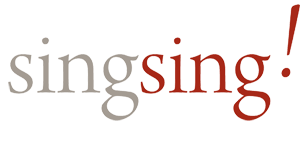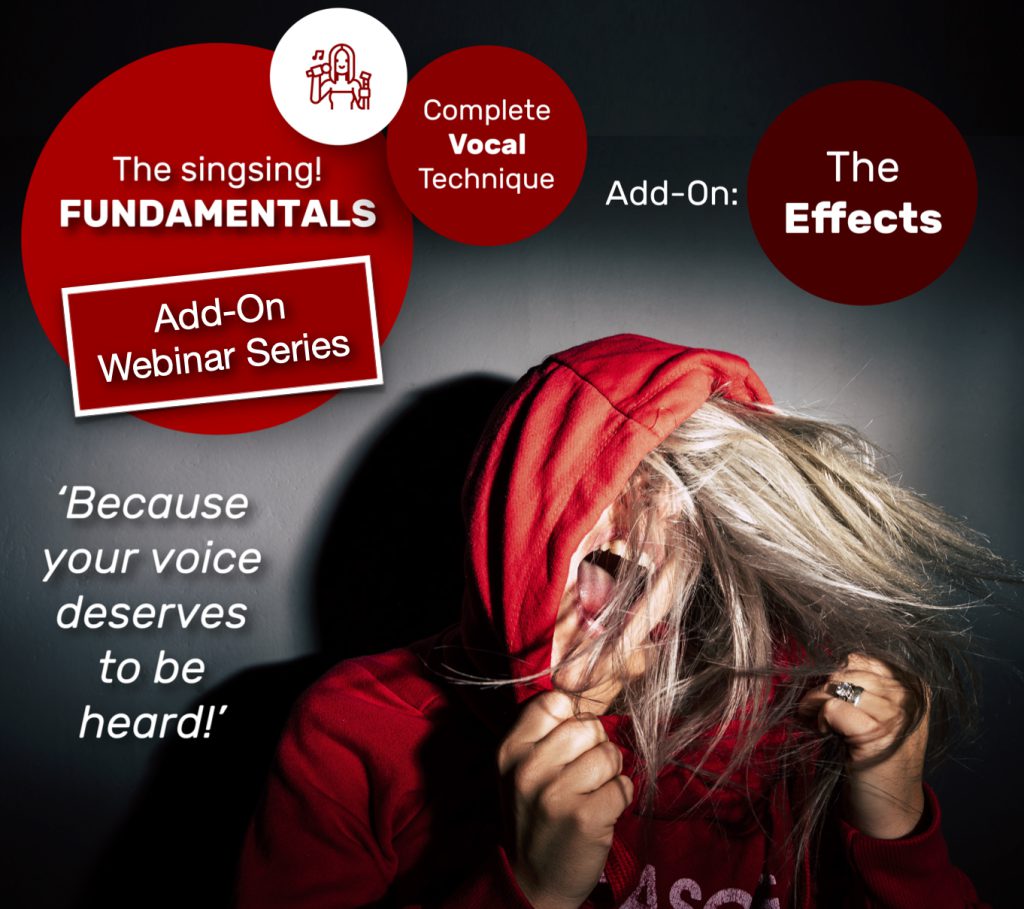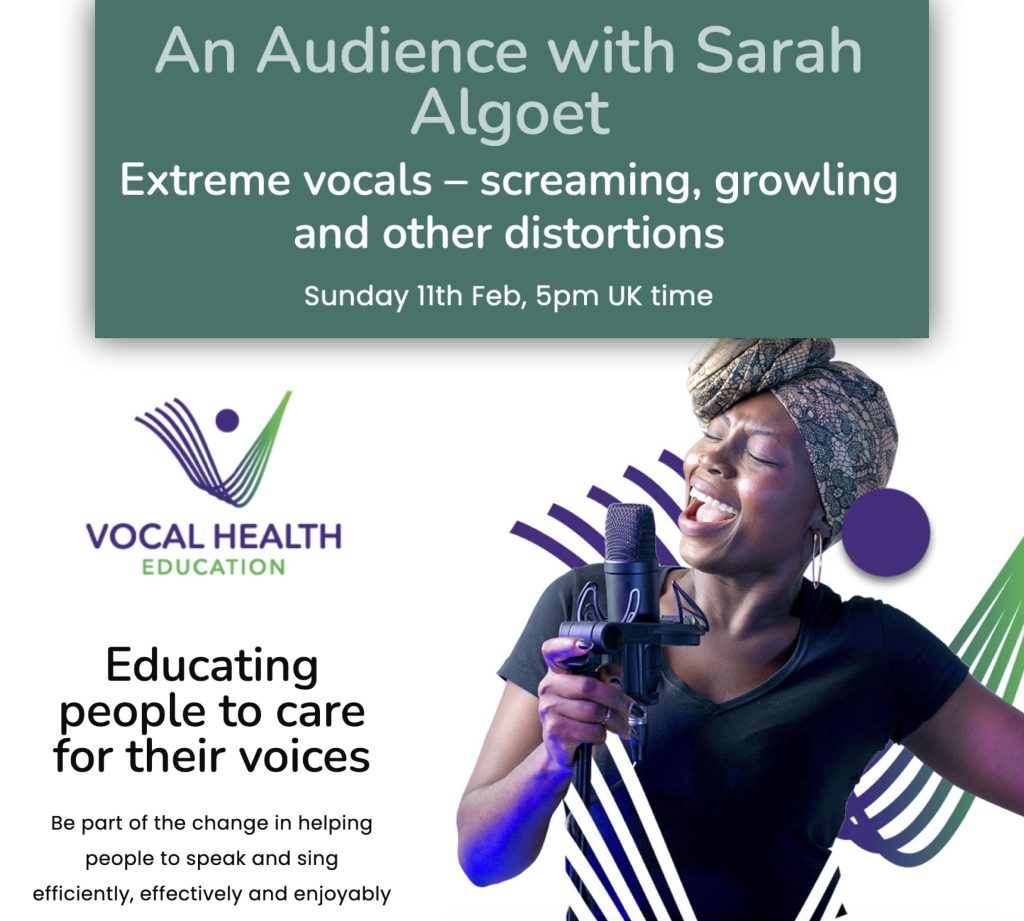
Scream Like a Kid! The Therapeutic Effects of the Extreme Vocal Effects
15/02/2024
I can’t believe that I have never written a blog post on the Extreme vocal effects!
I have lots of clients who scream their asses off, colleagues and organizations invite me to lead guest webinars on the subject and I currently offer 3 webinars on the extreme effects in The singsing! Sofa Library:
What we can learn from kids
In today’s blog post, I’ll tell you all about one of my biggest pet peeves: Kids have a lot to teach us on vocal technique and we, the adults, bear a big responsibility!
The extreme vocal effects are actually rooted in the natural vocal play we all engaged in as young children. In the Vocal Health Education webinar in which Dr. Jenevora Williams has interviewed me on extreme vocals, I explained how children experiment naturally with a range of vocal sounds on the playground, from high-pitched squeals to deep growls – without any formal training. These sounds are not necessarily harmful but rather a part of natural vocal exploration. It’s a powerful way to express their emotions! If kids can do it safely, then so can adults.
The reason young children can make these sounds in a healthy way is that they normally don’t have the inhibitions we often develop later on. They don’t have a concept of what’s “socially accepted” or “appropriate” in terms of sound, so they express their emotions without holding back. This lack of inhibition is crucial: These kids have no blockages and just let their emotions flow through their voices.
Unless we, the adults, instill those inhibitions and blockages in them…
Being a stepmom for 8 years now, I know that the advice I gave in the interview is sometimes difficult to follow 🙈 But I keep on trying to practice what I preach!
Are you ready for it?

The screaming daughter

Imagine your daughter entering the kitchen screaming. It’s a natural way for her to express and release excitement freely, but at the same time, her voice is really making your ears explode. It’s important to view moments like this as opportunities and not as problems.
If you shush your daugther without any explanation, she will not understand what you mean. You only want to ask her to reduce her volume, because it is hurting your ears. But this is what she might think, especially when the same scenario happens over and over again:
- “I can not scream / speak / sing with a loud volume.”
- “I’m not allowed to let my voice be heard freely.”
- “I have to hide how I feel.”
- “Mommy doesn’t want to hear my story.”
- “I always need to make sure that my presence makes other people happy.”
Now, imagine how your daughter would feel if you would say something along the lines of this: “Wow, you have a really strong voice today! However, my ears are hurting because of your high volume. Please, lower it a bit when you speak to me, so I can listen to you. Now, tell me all about the fun things you’ve been playing with! And after that, you can go back to the garden and have more fun.”
You are not dismissing screaming as a whole, her emotions, her presence, her story, her being,… You have created a safe space for your daughter to express her emotions and help her learn how to modulate her voice in a mindful way.
This is what she might understand now:
- “I’m allowed to scream / speak / sing in all volumes, and I need to learn to be mindful about people’s ears while doing so.”
- “I can express my emotions freely by letting my voice be heard, and it’s not OK to scream right into people’s ears.”
- “Mommy really wants to hear what I have to say. By screaming, I’m making it impossible for her to listen, so I need to lower my volume. I can go back to the garden and scream in excitement after I have shared my story with mommy.”
- “I’m not responsible for making other people happy, but I am responsible for not making their ears hurt.”

By responding in this way, we help children explore their vocal capabilities while also instilling the importance of self-awareness and emotional regulation. It encourages kids to experiment with their voices, all while learning to communicate their emotions more effectively and appropriately.
It also prevents potential issues with vocal health caused by frustration or anxiety built up due to the feeling that they aren’t allowed to express their emotions.
What About Anxiety & Frustration?

Jenevora highlighted in the interview that when children make extreme sounds, it often reflects their emotional state, and this can indeed be a healthy expression if managed well. However, she warned that if these sounds stem from anxiety or frustration, they might not always be safe or productive.
“It’s important to differentiate between healthy emotional expression and sounds that come from discomfort or distress,” she said. When these sounds come from a place of tension, it can lead to unhealthy vocal habits. This is because, in these emotional states, children might push their voices in ways that strain their vocal folds, leading to possible damage over time.
Therapy?
This whole story leads to an understanding of why learning to sing can take on a therapeutic quality. Engaging with the extreme vocal effects during voice lessons can be deeply personal and emotionally releasing. Jenevora responded “When we work with these effects, we often tap into and release pent-up emotions that might not have been addressed otherwise.” It’s like giving your voice a workout and emotional release simultaneously. By connecting vocal techniques to personal storytelling and emotional experiences, singers can experience a form of catharsis that not only enhances their vocal skills but also provides emotional healing.
Voice lessons are not therapy. Voice teachers are not therapists and they need to create a safe environment for the singers they are working with. Trauma-awareness is crucial and there are a lot of trainings on the market to make sure that we act within ethical and professional boundaries and refer on when needed!
Want to dive much deeper into the extreme vocal effects and see me teach them to some brave participants?
Subscribe to The singsing! Sofa Library to watch the webinar Vocal Health Education: Dr. Jenevora Williams interviews Sarah Algoet on Extreme vocals & More and scream like a kid!
As always, feel free to send me your thoughts, questions, and feedback in the comments below this blog, via the contact form or in the singsing! online community
Cordially,
Sarah




